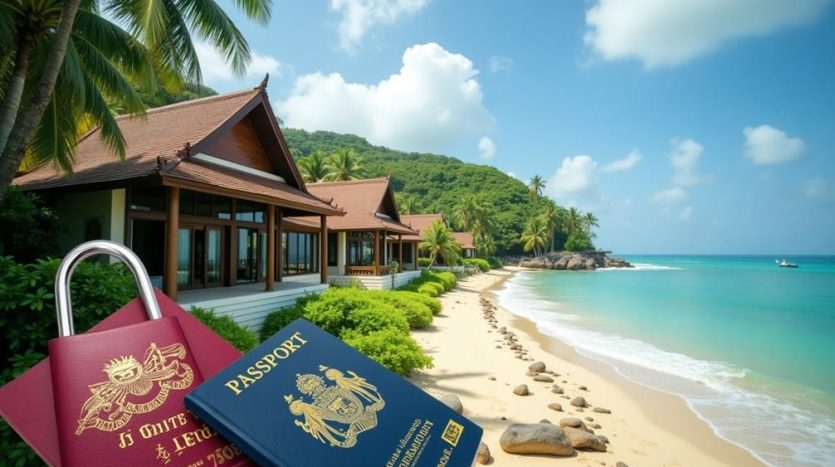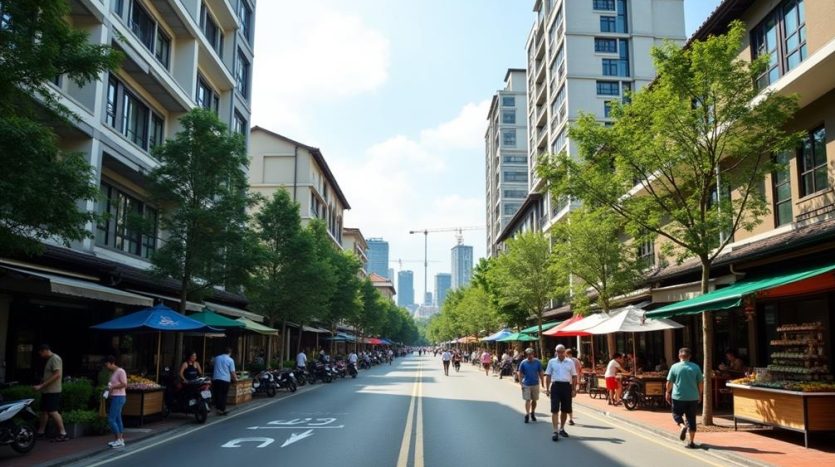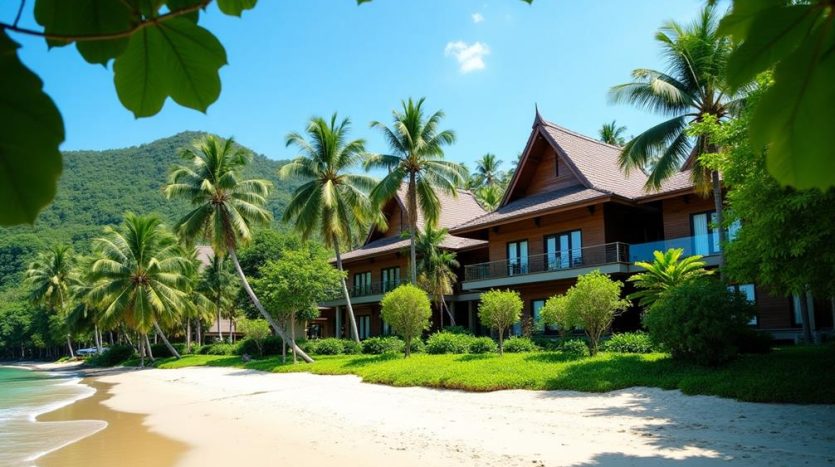Is It Safe to Buy Property in Thailand?
When considering whether it's safe to buy property in Thailand, you need to navigate a complex landscape of foreign ownership restrictions and legal frameworks. Despite the allure of beautiful locales and promising market trends, you can't just plunge into it without understanding the associated risks and challenges. Engaging a reputable lawyer and verifying all documents are essential steps you shouldn't overlook. But how do you guarantee you're making a secure investment? Before committing, there's much more you need to know to protect your interests and make informed decisions.
Key Takeaways
- Foreign ownership is limited; thorough knowledge of local laws and regulations is essential.
- Hiring a reputable lawyer can help navigate legal complexities and verify title deeds.
- Conducting due diligence and verifying property ownership can mitigate the risk of scams.
- Market trends and political stability should be monitored to make informed investment decisions.
- Leasehold agreements and company setups offer alternatives to direct land ownership for foreigners.
Foreign Ownership Restrictions
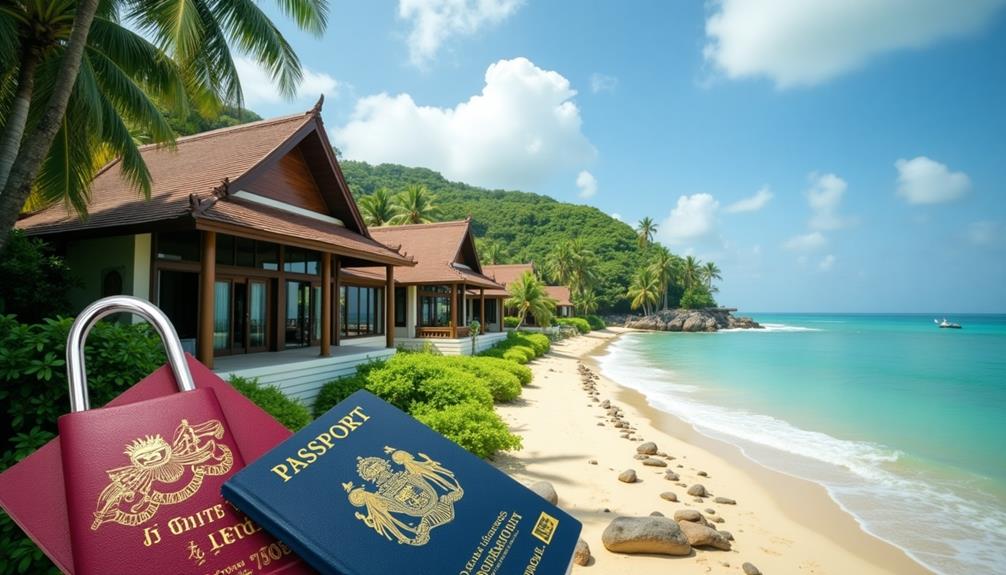
When considering buying property in Thailand, understanding foreign ownership restrictions is essential. You might think you can waltz in and snag a beachside villa, but Thailand has some quirks.
First, let's talk property types. If condos are your thing, you're in luck. Foreigners can own up to 49% of the total area of all condos in a building. For those dreaming of a house with a garden, it's trickier. You can't own land outright, but you can lease it for up to 30 years, with options to renew.
It's also worth noting that foreign property ownership in Thailand is heavily regulated to guarantee compliance with local laws.
Ownership structures are another puzzle piece. Many foreigners establish a Thai Limited Company, which can hold the land. However, the company needs to be majority Thai-owned, meaning you'll need local partners.
Remember, this isn't a loophole-free magic trick; it comes with its own set of complications and regulatory oversight.
Feeling adventurous? You might explore Investment Promotion Zones, where certain property types come with incentives. But don't get too excited—restrictions still apply.
Charting Thailand's property market requires a balance of optimism and realism. Keep these ownership structures in mind, and you'll avoid pitfalls while making your tropical dream a reality.
Legal Framework and Regulations
Maneuvering through the legal framework and regulations for buying property in Thailand can seem intimidating at first, but let's break it down.
First, you should know that Thailand's laws on property rights are quite clear-cut. Foreigners can't own land directly, but you can own buildings and condos. So, if you're eyeing that beachside property, consider a long-term lease or a condo unit.
It's also essential to verify the title deeds to confirm legitimacy and avoid potential disputes.
Now, let's talk about contract enforcement. Confirming that every "i" is dotted and every "t" is crossed is vital. Contracts should be detailed, covering aspects like payment terms, property specifications, and what happens if either party defaults.
You'll want to hire a reputable lawyer to draft and review these documents.
Moreover, the Land Department oversees property transactions, providing a layer of security. They verify titles and guarantee that the sale complies with Thai law. This step helps in reducing fraud and protects your investment.
To sum it up, maneuvering through Thailand's property regulations involves understanding your property rights and confirming robust contract enforcement.
It's like diving into a pool—once you know where the deep end is, the swim becomes enjoyable.
Market Trends and Conditions
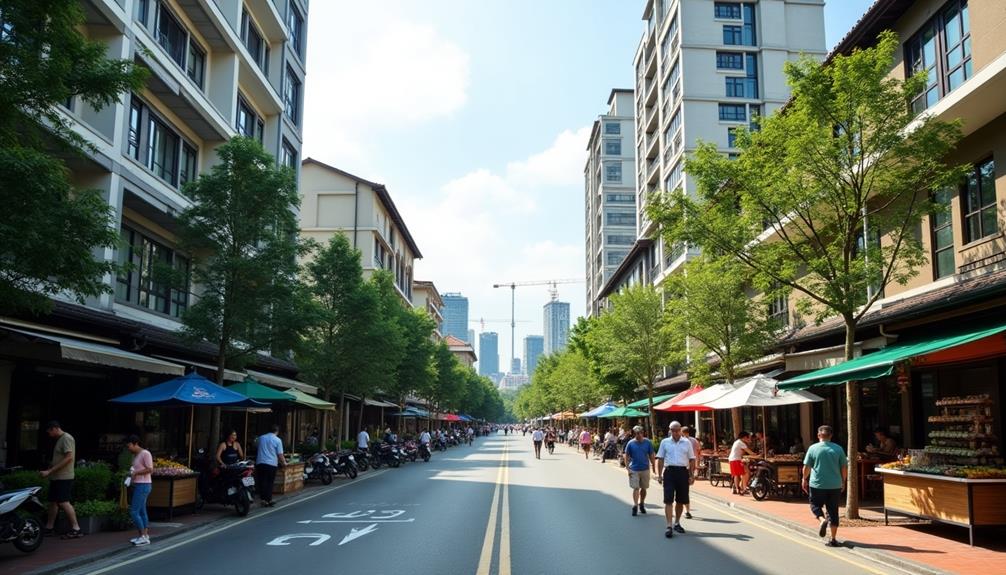
Diving into the market trends and conditions of Thailand's property sector reveals a dynamic landscape influenced by various economic, social, and political factors. You've got a mix of bustling cities and serene beaches, all playing a part in shaping property demand and investment opportunities.
Here's a quick snapshot to give you a clearer picture:
| Aspect | Insight |
|---|---|
| Economic Factors | Thailand's GDP growth impacts property prices. A higher GDP often means more investment opportunities. |
| Social Trends | Urbanization is driving demand in cities like Bangkok, while retirees flock to coastal areas. |
| Political Stability | The political climate can swing property demand; stability attracts foreign investors. |
Thailand's urban areas, especially Bangkok, are hotbeds for property demand due to rapid urbanization. If you're eyeing a condo in the city, you're not alone. On the flip side, resort destinations like Phuket and Pattaya offer lucrative investment opportunities, particularly for vacation rentals.
Economic performance is a biggie; a thriving economy generally boosts property values. But don't overlook social trends like the growing expat community, which adds another layer to property demand.
In a nutshell, Thailand's property market is as vibrant as its street markets—loaded with potential but requires a keen eye and a bit of savvy.
Risks and Challenges
While the market trends and conditions paint an optimistic picture of Thailand's property landscape, it's crucial to also consider the risks and challenges involved.
First, property scams are more common than you'd like to believe. Unscrupulous sellers may try to offload properties they don't even own, leaving you with nothing but a lighter wallet and a heavier heart. Always double-check ownership before signing anything.
Investment frauds are another significant concern. Some schemes promise sky-high returns, only to vanish faster than you can say "pad thai." If it sounds too good to be true, it probably is. Keep your expectations realistic and your wits about you.
Additionally, legal complexities can be a real headache. Thai property laws are intricate, and foreigners can't own land directly. Instead, you might've to go through leasehold agreements or set up a Thai company, both of which come with their own sets of risks.
Lastly, fluctuating market conditions can impact your investment's value. The market may be booming now, but that doesn't mean it's immune to downturns. Doing thorough research and staying informed can help you navigate these choppy waters.
Tips for Safe Investment

Maneuvering the complexities of Thailand's property market requires a strategic approach to minimize risks and maximize returns. You can't just throw darts at a map and hope for the best. Here are some tips to guarantee your investment is both safe and profitable:
1. Conduct Due Diligence: Before signing anything, investigate the property's legal status, verify ownership, and check for any encumbrances. Think of it as a treasure hunt, but instead of gold, you're digging for red flags.
Understanding the cost of living in areas like Koh Samui can also provide valuable context for your investment decisions.
2. Engage Professional Property Management: If you're not planning to live in your investment, hire a reputable property management company. They'll handle everything from tenant screening to maintenance, so you won't have to fly halfway around the world to fix a leaky faucet.
This is particularly useful given the diverse housing options available, from budget apartments to luxury villas.
3. Understand Local Laws: Thailand has specific regulations regarding foreign property ownership. Familiarize yourself with these laws to avoid unexpected surprises.
Ignorance isn't bliss when it comes to legal matters—consider it more like stepping on a legal landmine.

